|
Frequently Asked Questions (FAQ)
1. From the old San Rocco church, can I get a record for a baptism or a wedding? Yes,
as you know, the old San Rocco church has been closed since the early
1990s. The new San Rocco Oratory only has records dating back to
1999. To get a record of baptism or marriage from the old San
Rocco church, please contact the Archives Center of
the Archdiocese of Chicago, at 711 West Monroe, Chicago, Illinois
60661. That's where all the records are stored, from closed
parishes. If you wish, you can go directly to the sacramental records department. You can also call them at (312) 534-4400. Their email address is [email protected].
2. How do I reserve the hall, for dinner or a similar, special gathering? As you know, San Rocco Oratory has a new hall,
for your convenience, directly to the east of the parking lot; it's
named after St. Anthony. The address is 330 East 21st Street. You
are welcome to schedule receptions, dinners, and other events in this
hall. As of now, the hall is regularly used for dinners celebrated
in conjunction with anniversaries, baptisms, funerals, weddings, and quinceaneras.
There is a complete kitchen, as well as dining facilities for up to 200
people. The hall is air conditioned and comfortable. To reserve
the hall, call Yvette Betancourt at (312) 771-5027.
Se habla Espanol. If you
wish, you can email Yvette ([email protected]). Tell her the date(s) of your event, the kind of event, your name and your phone number.
She will be happy to help you.
3. Como reserver el salon? Ilama
Yvette Betancourt, (312) 771-5027, ahora. Yvette es muy
bondadosa. Como siempre, es possibile encontrarlo despues de la
misa dominical, c. 11. El salon esta disponsible a todos,
especialmente el pueblo catholico y las familias en la vecindad.
4. How do I make arrangements to remember the intention of a deceased relative, especially at Mass? Usually,
you would contact Jeanine Zamiar at (708) 331-5485. She
will then schedule the intention on a day that is available. As a general practice, at Sunday Mass, the name of the deceased is mentioned in the Eucharistic Prayer,
at the memento ("remembrance") of the dead. If a deacon is
present, he would read the name(s) aloud; this listing is called the dyptychs or diptychs. It
is an ancient Roman tradition. A visiting priest, however, may or
may not mention such names; the practice is optional, at the discretion
of the presider. For further information, see the page in this
website, Mass Intentions. In some parishes, you hear names mentioned during the General Intercessions,
the Prayer of the Faithful. Our tradition, however, is for the
petitions for the prayer of the faithful to be general in character,
without mention of the names of intentions of individuals.
Moreover, since the petitions are sung, individual names might or might
not be heard clearly and distinctly, in sung form. Overall,
then, it seems better for such intentions to be mentioned at
the customary places in the Eucharistic Prayer. In the first
prayer, the Roman Canon, there is a memento of the living shortly after the Sanctus,
before the Last Supper narrative. The remembrance of the dead
follows later on in the prayer, after the memorial section.
In all the other Eucharistic Prayers, such remembrances occur together,
in the last section of the prayer.
5. How do I arrange for an anniversary Mass for one of the faithful departed? Usually,
there are two times for such a Mass: thirty days after the date
of death or the funeral (the "Month's Mind") and one year
afterwards. Several
families at San Rocco have made arrangements to have such a Mass on a
weekday evening, say at 7 p.m., in memory of a deceased member of the
family. On one occasion, when we had no other choice, we did a
commemoration at Sunday Mass, with some special songs and prayers at the
end of Communion, as well as a brief eulogy. In
general, in the future, that would be done only by way of
exception. In any case, to make such arrangements, please call Father Gilligan at (708) 331-5485 or send an email to [email protected].
6. O.K. So, what's an oratory?  An
oratory is a place for liturgy and private prayer, for a determined
group of the faithful. Unlike a parish church, it does not
normally have the full range of services that would be expected.
Like a mission, an oratory can be affiliated with another, full-service
church, such as St. Agnes. Or, an oratory can be
free-standing. Some oratories are really huge, such as that of St. Anne de Beaupre'
in Quebec. They have plenty of Masses and other liturgies,
often. It all depends on the need, as the bishop decides. An
oratory is a place for liturgy and private prayer, for a determined
group of the faithful. Unlike a parish church, it does not
normally have the full range of services that would be expected.
Like a mission, an oratory can be affiliated with another, full-service
church, such as St. Agnes. Or, an oratory can be
free-standing. Some oratories are really huge, such as that of St. Anne de Beaupre'
in Quebec. They have plenty of Masses and other liturgies,
often. It all depends on the need, as the bishop decides.
7. Why did Cardinal Bernardin permit this Oratory? 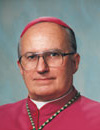 Most Rev. Raymond Goedert was vicar general in 1998. In that capacity, he formulated the statuta,
the foundational principles of the oratory. In that document,
there were two purposes given: provision for people who were
Italian and for promotion of devotion to St. Rocco. Most Rev. Raymond Goedert was vicar general in 1998. In that capacity, he formulated the statuta,
the foundational principles of the oratory. In that document,
there were two purposes given: provision for people who were
Italian and for promotion of devotion to St. Rocco.
At
least on the part of those who wanted to set up the oratory, the
real reason, it seems, is that there was and is a vibrant community,
people who knew each other well, who had long-term relationships, and
who wanted to continue to celebrate the liturgy together, as they had
done for generations. Their number was adequate, and their funds
were sufficient. Moreover, the community that had been built over
the years is itself precisely what the Church is called to be and what a
parish itself is meant to be: a family of faith. Pastorally,
these reasons seem to the rector to trump all other negative
arguments. To be fair, all this is a matter of interpretation, not
evidence. On such questions, even good people can certainly be of
different perspectives. Anyway,
what is decisive now is that our current diocesan bishop, Blase
Cupich, has
always supported the oratory, as has his vicar, Most Rev. Joseph
Perry. There can be no doubt that the Archdiocese supports the
community of San Rocco and will do so for a long time to come. 8. So, what is a rector? 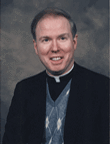 The
term is used in Latin for the priest who is assigned by the bishop to
take care of a church, especially to see to its maintenance and to the
regular celebration of the liturgy, as well as financial administration.
In the U.S., we have taken the term pastor
from the Protestants and put it in wide use. In English, we
have often spoken of the rector of a cathedral or a seminary, in that
case retaining Latin usage. In practical terms, we are told
that the rector of San Rocco has most of the responsibilities of a
"pastor," except that not all services need be provided. There are,
then, fewer obligations, as well as less compensation. Certainly,
the rector cannot be obligated to provide for all Italian
Americans in the southern suburbs, nor for any particular
territory. The
term is used in Latin for the priest who is assigned by the bishop to
take care of a church, especially to see to its maintenance and to the
regular celebration of the liturgy, as well as financial administration.
In the U.S., we have taken the term pastor
from the Protestants and put it in wide use. In English, we
have often spoken of the rector of a cathedral or a seminary, in that
case retaining Latin usage. In practical terms, we are told
that the rector of San Rocco has most of the responsibilities of a
"pastor," except that not all services need be provided. There are,
then, fewer obligations, as well as less compensation. Certainly,
the rector cannot be obligated to provide for all Italian
Americans in the southern suburbs, nor for any particular
territory.
It seems just and
right that the community of San Rocco should have whatever services
Catholics are entitled to, such as hospital visitation, the full range
of sacraments, and the usual course of celebration of the liturgy,
including the Eucharist and the Liturgy of the Hours.
This end is effectively achieved by assigning a priest to the oratory,
as rector. The size of the community is small, to be sure;
but so are many communities that are actually parishes. Many
Protestants would be delighted to have a church family with the
vitality, numbers, and liturgies of which St. Rocco can be proud.
In fact, precisely because of its size, St. Rocco Oratory has a stronger
sense of family and community than would be found in churches that have
more than one Eucharist on Sunday. The oratory is closer to the ideal
size of a parish than most of the parishes in the Archdiocese.
Veni et vide.
9. Is it "San Rocco" or "St. Rocco"? You use both. Which is it?  The official name of the oratory, as that of the parish in the same
location, is "San Rocco." That is how many of the people born in
Italy speak of the oratory. However, many of the people born here
say "St. Rocco." So, on these pages, we use both. The official name of the oratory, as that of the parish in the same
location, is "San Rocco." That is how many of the people born in
Italy speak of the oratory. However, many of the people born here
say "St. Rocco." So, on these pages, we use both.
The same saint is also known in French and English as "St. Roch." That's correct, too.
10.
In this website, you often speak of Archbishop Blase as our
bishop. Isn't Most Rev. Joseph Perry our bishop? What's the
difference? The
head of a diocese (or archdiocese, in this case) is called a bishop,
that is, a "supervisor" or "superintendent." He is the chief
pastor of the local Church, the diocese, the first minister of the sacraments of initiation. He is the one responsible for the whole Church, in this region,
especially the clergy. In fact, he has the leadership needed to
transfer priests and deacons, to guide them, to remove them
from office, and to ordain laity to be either priests or deacons.
The sacramental activity of all the clergy must be carried out in
communion with him, because he is the head of the Church here and
now. In this sense, Cardinal Cupich
is called in current Church parlance the "diocesan bishop" or, if you
will, the bishop of the diocese. Many of the rituals and
customs that pertain to his office exist to reinforce his
leadership, in teaching, in legislating, in
administration. (As of 2016, Archbishop Blase has been appointed a Cardinal.)
He is the one responsible for the whole Church, in this region,
especially the clergy. In fact, he has the leadership needed to
transfer priests and deacons, to guide them, to remove them
from office, and to ordain laity to be either priests or deacons.
The sacramental activity of all the clergy must be carried out in
communion with him, because he is the head of the Church here and
now. In this sense, Cardinal Cupich
is called in current Church parlance the "diocesan bishop" or, if you
will, the bishop of the diocese. Many of the rituals and
customs that pertain to his office exist to reinforce his
leadership, in teaching, in legislating, in
administration. (As of 2016, Archbishop Blase has been appointed a Cardinal.)
More important than all these roles is that he has the fullness of sacramental ordination, given to the apostles,
in such a way that all priests and deacons depend upon him for the
legitimacy and, some would say, the validity of their ministry within
the diocese.  Moreover, it is his duty to maintain communion with the universal Church, including Pope Francis,
the Bishop of Rome. It is not that the Pope governs through
Archbishop Blase. It is rather that we maintain communion with our
bishop; he in turn maintains communion with the Pope. Moreover, it is his duty to maintain communion with the universal Church, including Pope Francis,
the Bishop of Rome. It is not that the Pope governs through
Archbishop Blase. It is rather that we maintain communion with our
bishop; he in turn maintains communion with the Pope. 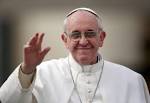 It is
important to emphasize the sacramental role of the bishop of the
diocese, because that is the foundation for all his other
functions and for the vitality of the local Church
itself. This is why we speak of Archbishop Blase as the
"bishop of the diocese" or the "diocesan bishop." In legal terms,
the State of Illinois identifies him as the "Catholic Bishop of
Chicago." It is
important to emphasize the sacramental role of the bishop of the
diocese, because that is the foundation for all his other
functions and for the vitality of the local Church
itself. This is why we speak of Archbishop Blase as the
"bishop of the diocese" or the "diocesan bishop." In legal terms,
the State of Illinois identifies him as the "Catholic Bishop of
Chicago."
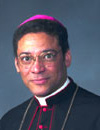 Most Rev. Joseph Perry is called a "titular" bishop. He has the title of the role, as well as some limited expression of it. James Coriden,
a canon law expert, says that such a bishop, in his capacity, has no
teaching or legislative authority; instead, he is limited to
administrative work. As a general rule, even that authority
is restricted. In this case, as vicar, Bishop Perry
administers the region of Vicariate VI, our section of the
diocese. He does not have this leadership in other
vicariates. However, he is especially important to us,
since his advice and consent will be critical to any pastoral decisions
that are made. He also has considerable wisdom and knowledge to
impart to us. Even though he may not teach or legislate as a
bishop, he is still a priest of the diocese and so can teach in that
capacity; even if he does not legislate, we should work with him, as he
implements laws and policies that apply to us. It is in his
capacity as vicar that he matters very much to us. Most Rev. Joseph Perry is called a "titular" bishop. He has the title of the role, as well as some limited expression of it. James Coriden,
a canon law expert, says that such a bishop, in his capacity, has no
teaching or legislative authority; instead, he is limited to
administrative work. As a general rule, even that authority
is restricted. In this case, as vicar, Bishop Perry
administers the region of Vicariate VI, our section of the
diocese. He does not have this leadership in other
vicariates. However, he is especially important to us,
since his advice and consent will be critical to any pastoral decisions
that are made. He also has considerable wisdom and knowledge to
impart to us. Even though he may not teach or legislate as a
bishop, he is still a priest of the diocese and so can teach in that
capacity; even if he does not legislate, we should work with him, as he
implements laws and policies that apply to us. It is in his
capacity as vicar that he matters very much to us.
There are two other Catholic bishops in this region, one for the Ukrainian Catholics, another for the Syro-Malabar Catholics.
In territory, both dioceses are much larger than the Roman Catholic
Archdiocese of Chicago; both dioceses are in full communion with the
Pope, with Archbishop Cupich, and with us. Locally, there are also
several other Orthodox bishops, not yet in complete unity with us;
for example, there is a Greek Orthodox bishop, as well as one for the Serbs,
another for the Ukrainians, and others. In general, Orthodox
Churches and their bishops possess the fullness of the Catholic faith;
however, at the present moment, they are not yet in full communion with
us. Unlike the Protestants, the Orthodox and their hierarchy have
preserved the apostolic teachings and the sound tradition of the early
Church. As a rule, the Orthodox bishops have legitimate
authority and leadership. 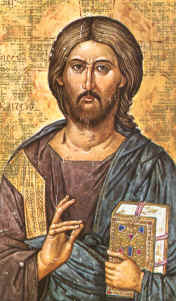 As far as the sacraments are concerned, their efficacy and power come from Jesus Christ.
The Eucharist celebrated by a hospital chaplain, in a small chapel,
has the same Christ, risen and active, as the Eucharist celebrated
in a cathedral by an archbishop. What counts are the
principal agent of the sacraments, Jesus Christ, and the community in
which they are celebrated, the unity of the Holy Spirit, that is,
the Catholic Church. As far as the sacraments are concerned, their efficacy and power come from Jesus Christ.
The Eucharist celebrated by a hospital chaplain, in a small chapel,
has the same Christ, risen and active, as the Eucharist celebrated
in a cathedral by an archbishop. What counts are the
principal agent of the sacraments, Jesus Christ, and the community in
which they are celebrated, the unity of the Holy Spirit, that is,
the Catholic Church.
|
|
|
|




 The
term is used in Latin for the priest who is assigned by the bishop to
take care of a church, especially to see to its maintenance and to the
regular celebration of the liturgy, as well as financial administration.
In the U.S., we have taken the term
The
term is used in Latin for the priest who is assigned by the bishop to
take care of a church, especially to see to its maintenance and to the
regular celebration of the liturgy, as well as financial administration.
In the U.S., we have taken the term 
 He is the one responsible for the whole Church, in this region,
especially the clergy. In fact, he has the leadership needed to
transfer priests and deacons, to guide them, to remove them
from office, and to ordain laity to be either priests or deacons.
The sacramental activity of all the clergy must be carried out in
communion with him, because he is the head of the Church here and
now. In this sense,
He is the one responsible for the whole Church, in this region,
especially the clergy. In fact, he has the leadership needed to
transfer priests and deacons, to guide them, to remove them
from office, and to ordain laity to be either priests or deacons.
The sacramental activity of all the clergy must be carried out in
communion with him, because he is the head of the Church here and
now. In this sense,  It is
important to emphasize the sacramental role of the bishop of the
diocese, because that is the foundation for all his other
functions and for the vitality of the local Church
itself. This is why we speak of Archbishop Blase as the
"bishop of the diocese" or the "diocesan bishop." In legal terms,
the State of Illinois identifies him as the "Catholic Bishop of
Chicago."
It is
important to emphasize the sacramental role of the bishop of the
diocese, because that is the foundation for all his other
functions and for the vitality of the local Church
itself. This is why we speak of Archbishop Blase as the
"bishop of the diocese" or the "diocesan bishop." In legal terms,
the State of Illinois identifies him as the "Catholic Bishop of
Chicago." Most Rev. Joseph Perry is called a "titular" bishop. He has the title of the role, as well as some limited expression of it.
Most Rev. Joseph Perry is called a "titular" bishop. He has the title of the role, as well as some limited expression of it.  As far as the sacraments are concerned, their
As far as the sacraments are concerned, their  top
top